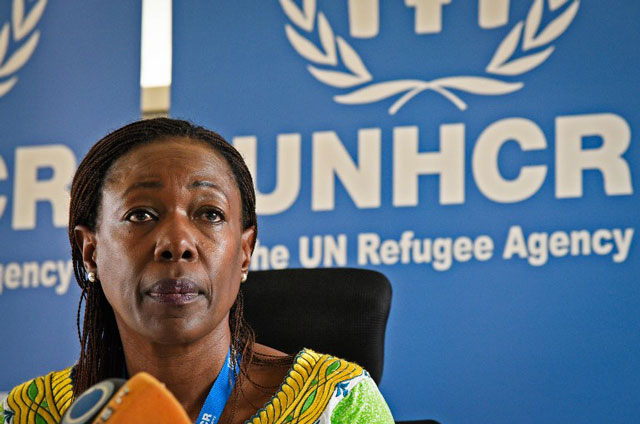
Kampala, Uganda | AFP | Ugandan police said Friday they had arrested 10 officials working at a camp housing refugees, mainly from neighbouring Democratic Republic of Congo, for stealing food aid.
Benon Byamukama, police chief for the region in western Uganda where the Kyaka II refugee camp is located, said they had been caught stealing maize meal and cooking oil meant for refugees at night.
“Acting on a tip-off, we have arrested 10 officials from Kyaka II refugee camp including two staff of Danish Refugee Council, an implementing agency for the World Food Programme, for selling on the black market food meant for refugees,” he said.
“We have recovered the food and it will be used as exhibit in court,” said Byamukama.
Kyaka II began as a camp for Rwandan refugees in 2005, but violence in DRC has seen citizens from that country take over as the main residents.
According to the United Nations refugee agency, a fresh outbreak of fighting in DRC saw an estimated 17,000 new refugees arrive in December 2017, with the camp’s population now standing at about 45,000.
The WFP could not be immediately reached for comment.
Last month, Uganda stepped up investigations into recent corruption allegations by indicting the Commissioner for Refugees in the Office of the Prime Minister Apollo Kazungu. Simon Gerald Menhya was appointed acting commissioner.
Hillary Onek, Minister of disaster preparedness and refugees and Musa Ecweru, State minister of disaster preparedness and refugees confirmed the recent suspension of Kazungu.
The change comes before UNHCR, the UN Refugee Agency, together with partners in government and NGOs launched a bio-metric verification exercise targeting all refugees in Uganda.
For several weeks, the Ugandan government and their partner agencies, including UNHCR, have been investigating allegations of inflation of refugee numbers, mismanagement of donor funds meant for refugees, along with other serious allegations of corruption. Uganda hosts more refugee than any other African country.
An internal Ugandan government document, dated 29 January and circulated by the prime minister’s office and seen by AFP, raises corruption allegations including that Ugandan officials extort money from newly-arrived refugees, insisting on payment before providing the free registration service that allows access to aid.
The UN’s top official in Uganda, Rosa Malango, said the UN refugee agency (UNHCR) and World Food Programme (WFP) were undertaking internal audits of their Uganda operations over the claims.
The Ugandan investigation follows Malango writing to the prime minister on January 26 raising allegations ranging from “corruption to fraud, from trafficking of women and girls to intimidation and harassment of UN personnel”.
“The moment anybody raises anything that looks or smells like sexual exploitation or abuse I must demand for an immediate investigation, and I must demand for immediate action because we have zero tolerance,” she told AFP, adding Ugandan authorities have promised to investigate these claims too.
So far, Uganda has not publicly addressed the sex trafficking allegations, although they do feature in the government’s internal memo of January 29.
“Trafficking of minor girls and women is high on the radar,” it said.
The specific allegations, said a diplomat familiar with the charges, are that South Sudanese girls and women are being trafficked from the refugee camps of northern Uganda back across the border.
There, they are sold as “wives” to combatants with the possible knowledge or complicity of Ugandan officials, the diplomat said.
UNHCR’s Biometric verification
“The biometric verification will strengthen the integrity of the data underpinning the refugee operation, and will allay any concerns that refugee numbers are inflated,” UNHCR’s Senior Regional Spokesperson Teresa Ongaro told the press in Kampala on February 20, 2018.

“From the outset, we wish to address the incorrect media reports and narratives which are depicting the malaise as one by UN and UNHCR staff.”
Meanwhile, in accordance with standard practice, Ongaro said UNHCR’s independent Inspector General’s Office is pursuing internal investigations on some serious allegations received at the end of 2017, including fuel embezzlement, allegations of sexual exploitation and abuse, irregular tendering of water trucking, and fraud in food distribution.
“Internally, UNHCR is strengthening its monitoring and oversight capacity in order to identify and address weak points that may exist that could facilitate fraud, including the deployment of more senior staff to help put in place additional safeguards.”
Uganda has been widely praised for its progressive refugee policy. Ugandan officials claim to house 1.4 million refugees, a million of whom have fled the ongoing civil war in South Sudan.
Although among the world’s poorest countries, Uganda has welcomed refugees, giving them land and the opportunity to work, in stark contrast to many richer nations.
Only last month , UN refugees chief Filippo Grandi hailed Uganda for having, “one of the most progressive policies for refugees, not only in Africa but also in the world”.
But diplomatic sources told AFP that one large Western donor has already suspended aid because of the graft allegations, and others are threatening to follow suit.
The donors are demanding the implementation of a UN-controlled biometric system of refugee identification.
The European Union said it has referred the allegations to its own anti-fraud office.
 The Independent Uganda: You get the Truth we Pay the Price
The Independent Uganda: You get the Truth we Pay the Price



